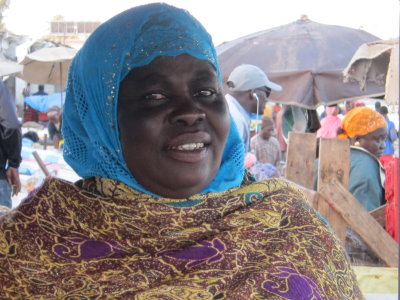 This interview was conducted as part of the efforts of Mundus maris to provide a path for women in small-scale fisheries to provide information about their daily lives and ambitions in a "interconnected and changing world" through mini reports, interviews and, if possible a few short videos. How women experience the different impacts of globalisation and what specific initiatives they take to cope, in order to stay in this sector. Following a meeting at which the Vice President of Mundus maris, Aliou Sall, was invited by the Economic Interest Grouping (GIE) PARASE of which Khady Sarr is the Secretary General, the interview took place (see below).
This interview was conducted as part of the efforts of Mundus maris to provide a path for women in small-scale fisheries to provide information about their daily lives and ambitions in a "interconnected and changing world" through mini reports, interviews and, if possible a few short videos. How women experience the different impacts of globalisation and what specific initiatives they take to cope, in order to stay in this sector. Following a meeting at which the Vice President of Mundus maris, Aliou Sall, was invited by the Economic Interest Grouping (GIE) PARASE of which Khady Sarr is the Secretary General, the interview took place (see below).
MM: Congratulations on these initiatives you are taking. I would like you to tell me more about some of the things that caught my attention in this very informative meeting for me and our Mundus maris association. But to begin, it might be good to introduce yourself.
K.S.: I am from Hann Pêcheurs (Fishers). I know that it is not for you that I will introduce myself, because you know my family and especially my father El haj Mbaye Sarr. We are one of the first fishing families to settle in Hann. I am a fish monger by profession, a job that I inherited from my mother who has exercised it all her life. I am general secretary of the GIE PARASE and manager of the Women's Mutual Fund of the GIE.
MM: Would you tell us about all these constraints that you have to overcome in the following areas that have struck me the most during the meeting? Let's start with your conditions of access to the raw material. Are there any changes to note in this regard?
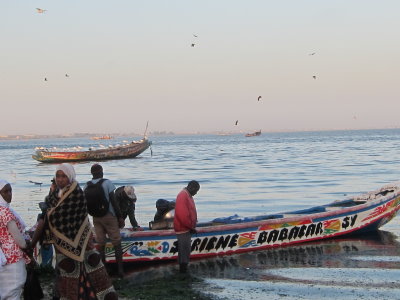 K.S.: Being yourself from this community, you know that traditionally, as soon as the fishers return to their home port, the sale of all the catches was entrusted to a woman from the family concession. It may be the fisher's wife, his mother, or another woman who is part of the same core lineage. This same woman in charge of the disposal of the catch, also made all the necessary arrangements to ensure that the family's fishing unit obtained the funds required for the pre-financing of the fishing trips. Whatever the outcome of the fishing operations (good catch or return to the landing area without fish), women from our communities have always helped to maintain the family unit, allowing the fisher to stay in the activity.
K.S.: Being yourself from this community, you know that traditionally, as soon as the fishers return to their home port, the sale of all the catches was entrusted to a woman from the family concession. It may be the fisher's wife, his mother, or another woman who is part of the same core lineage. This same woman in charge of the disposal of the catch, also made all the necessary arrangements to ensure that the family's fishing unit obtained the funds required for the pre-financing of the fishing trips. Whatever the outcome of the fishing operations (good catch or return to the landing area without fish), women from our communities have always helped to maintain the family unit, allowing the fisher to stay in the activity.
This has always been possible thanks to the income we traditionally derive from our activities, the savings we mobilise from our tontines and various forms of contributions from our own family assets. It can also involve soliciting a family member in case of emergency to pre-finance a fishing trip in case the woman in charge of marketing does not have cash. Our traditional role as the first link in the chain as a sales person involved both demersal export species and pelagic species with lower commercial value for the domestic market. Until a relatively recent period, if we put it back in the trajectory of artisanal fisheries, the status which we enjoyed has completely evolved to our disadvantage.
MM: That means?
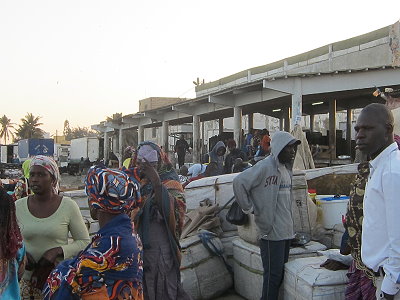 K.S.: We have lost our prerogatives and this has coincided with profound changes in the close relationship that the woman (of a fishing community) traditionally had with the fisher, that is, the fishing unit from this same family. The trend that has developed over the last eight or ten years and continues to develop is that, with a few exceptions, the overwhelming majority of women no longer have priority of access to the catches of their family units. This trend has started in units specialised in the capture of high value species for export, before reaching units specialised in pelagic species with low commercial value and traditionally destined for local consumption.
K.S.: We have lost our prerogatives and this has coincided with profound changes in the close relationship that the woman (of a fishing community) traditionally had with the fisher, that is, the fishing unit from this same family. The trend that has developed over the last eight or ten years and continues to develop is that, with a few exceptions, the overwhelming majority of women no longer have priority of access to the catches of their family units. This trend has started in units specialised in the capture of high value species for export, before reaching units specialised in pelagic species with low commercial value and traditionally destined for local consumption.
MM: Can you explain this process in some more detail?
K.S.: There is a combination of factors that has begun - and will continue unless we react - to challenge the important social status that we traditionally enjoy. You know, that may be a problem related to our conception of life, our culture, otherwise we women from fishing communities, we generally had nothing to envy other women who work hard in other sectors such as petty trading, agriculture, etc
MM: Ah, yes? Can you elaborate a little further?
K.S.: The proof is that we give work to thousands of people, a large part of whom are women like these scalers, among others, whom you have just met and who are members of our GIE. So, as you can see for yourself, a lot of these women, who buy and sell very small quantities of fish daily on the beach to get enough to support themselves, are outside our community and come from the suburbs (Pikine, Guédiawaye, etc.).
Now, to go back to how it works, of the various factors that contributed to this process of progressive loss of prerogatives, we can retain the following to try to summarize even if it will be difficult.
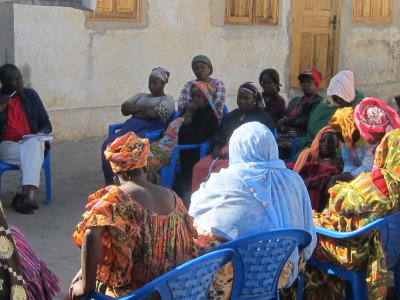 First of all, it must be understood that, for export species, we have seen a decline in groundfish resources in recent years, combined with an increase in production costs. Before, in order to equip oneself with an ice-canoe for line fishing, one of the types of specialised fishing in this sub-sector, it took a total investment not exceeding three to three and a half million CFA francs (pirogue, 40 CV engine, removable insulated box, and other rigging).
First of all, it must be understood that, for export species, we have seen a decline in groundfish resources in recent years, combined with an increase in production costs. Before, in order to equip oneself with an ice-canoe for line fishing, one of the types of specialised fishing in this sub-sector, it took a total investment not exceeding three to three and a half million CFA francs (pirogue, 40 CV engine, removable insulated box, and other rigging).
MM: What do you mean?
K.S.: As the fishing grounds were not as far away as they are today, it was enough for us as a fisherman's wife to mobilise an amount ranging from two to three hundred thousand FCFA maximum to cover the costs of a fishing trip (fuel, food and all inclusive). This sum is not insignificant but considering our position of yesteryear, which was privileged as the first link in the chain of sale, well before any other male fish monger or plant manager would arrive, the income derived allowed us somehow to deal with the situation. All the more so because the fish caught with hand lines were species with a very high commercial value which generated quite substantial profits. But you know that most of these pirogue trips now depend on resources fyrther and further away from their home port and demand much more capital.
MM: So this has all changed now. Please explain.
K.S.: You know, now by force of circumstance, despite the willingness of some of our fisher parents to help us make the most of this activity, we have lost much of the influence we had in the marketing channels of high value species, in favour of wholesalers and fish meal factories with a stronger financial base. This has made it all more complicated for us given the level of prefinancing needed for fishing trips targetting these species.
MM: What does this mean? Would you detail a bit further?
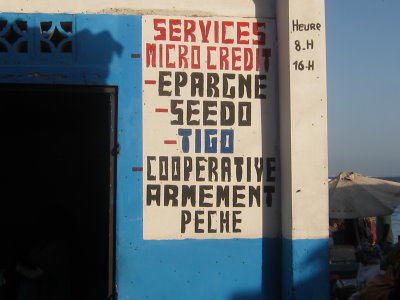 K.S.: It's easy to understand. The level of investment can no longer be sustained by women, who only rely on their own family wealth and savings and that we manage to mobilise with the tontines. Before, even for women from the community and families who do not own an active fishing unit, it was enough for them to muddle through to obtain a sum ranging between ten and fifteen thousand FCFA, to buy some beautiful pieces of fish she could sell on the beach to retailers or consumers of the middle class in the capital and make a profit per day of two to five thousand five hundred FCFA in less than one hour, according to the market situation of the moment.
K.S.: It's easy to understand. The level of investment can no longer be sustained by women, who only rely on their own family wealth and savings and that we manage to mobilise with the tontines. Before, even for women from the community and families who do not own an active fishing unit, it was enough for them to muddle through to obtain a sum ranging between ten and fifteen thousand FCFA, to buy some beautiful pieces of fish she could sell on the beach to retailers or consumers of the middle class in the capital and make a profit per day of two to five thousand five hundred FCFA in less than one hour, according to the market situation of the moment.
In the space of eight to ten years, the cash price at landing of a fish box of sixty liters, that is to say, about fifty kilos of high value species, has increased from sixty-five to a maximum of one hundred thousand FCFA depending on the species to two hundred to two hundred and fifty thousand or even three hundred thousand FCFA.
MM: We can therefore say that the level of investment reached is the main factor explaining your marginalisation within these circuits, undermining your former prerogatives?
K.S.: No, there is another side to this rising cost of fishing equipment. The cost of the trip fees that the woman traditionally provided is no longer bearable. With the remoteness of the fishing grounds, the duration of the fishing trips has gone from two, three or even four days at the most, today up to fifteen and even twenty-twenty-two days at sea of the big pirogues carrying ice-filled isothermic containers. This has increased the cost of trips from two to three hundred thousand FCFA to more than one million FCFA for these large ice-container pirogues that you see there.
MM: Is that something specific for the fishery for demersal species?
K.S.: Not at all! This difficult context for the fishers has not spared the small pelagic fishery either. Indeed, the prices of the main components of the fishing unit (canoes, nets and engines) have increased by almost two times. While eight to ten years ago, with an investment ranging from seven and a half to eight million CFA francs, a purse seine fisher could fully renew his unit, the largest of which at the time was fifteen to seventeen meters. Costs of fishing trips (fuel costs in particular) exceeded barely twenty to thirty thousand FCFA. Nowadays, it takes a minimum of seventeen to twenty million CFA francs or more to acquire a purse seine unit with 21 to 23 meters long pirogues, using more and more powerful engines. The trend is to generalise the use of Yamaha engines of 60 to 65 hp.
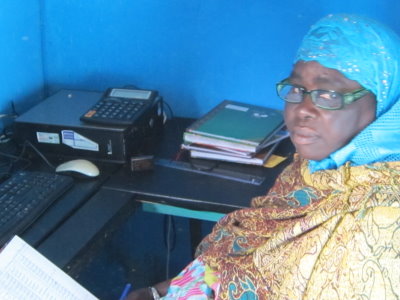 This new context can only play to our disadvantage and to the benefit of operators with a more solid financial base, including wholesalers. With the poor pelagic fishing season that we have seen in recent years, resulting in either a shift in seasonality or a drop in landings, that does not help matters. Also with the close relations that the women managing family units had with the managers of fuel stations, they agreed to deliver fuel on credit, until our pirogue realised a good turnover. This is no longer the case. All this contributed to the precariousness of our conditions.
This new context can only play to our disadvantage and to the benefit of operators with a more solid financial base, including wholesalers. With the poor pelagic fishing season that we have seen in recent years, resulting in either a shift in seasonality or a drop in landings, that does not help matters. Also with the close relations that the women managing family units had with the managers of fuel stations, they agreed to deliver fuel on credit, until our pirogue realised a good turnover. This is no longer the case. All this contributed to the precariousness of our conditions.
MM: Do these developments you describe have yet other effects?
K.S.: Contrary to what people believe, who live far from fishing communities, we traditionally enjoy a better status than women in other sectors of activity which gives us some little known basic roles. Our most important role is in social reproduction. Indeed, as there are no writings on this, some do not know that we are very involved as women in the education of children, the financial support of their schooling, contributing financial support during cultural, religious and health care ceremonies, which do not spare any family. So, if our income is no longer guaranteed because of the profound changes I've described, how are we going to continue to deal with these issues? This is the real reason for our initiative with the GIE we created.
MM: Exactly, would you elaborate a bit more? Which initiative do you undertake to solve what type of problem?
K.S.: The first concern that drove us to organise with other women is the issue of funding our day-to-day activities. Indeed, we made the following double observation. First, traditional banks (commercial banks) have never accepted to adapt to the realities of small-scale fishing and have regularly refused to solve our financing problems. When they accept to grant a loan, it is to impoverish us.
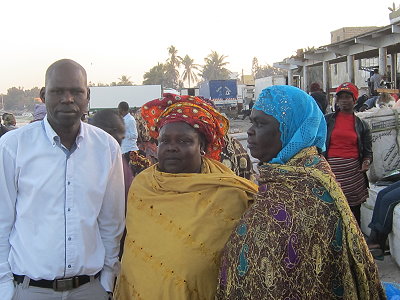 Secondly, since a few years, credit mutual funds approved by the Ministry of Finance emerged with a national grid observed today. But even these networks, called mutualist, only impoverish us with draconian conditions of access to credit for the majority of them we have experienced. These mutual funds charge exorbitant interest rates in most cases in the range of 12 to 14 per cent. We said enough and managed to set up a fund, fueled by the daily contribution of members.
Secondly, since a few years, credit mutual funds approved by the Ministry of Finance emerged with a national grid observed today. But even these networks, called mutualist, only impoverish us with draconian conditions of access to credit for the majority of them we have experienced. These mutual funds charge exorbitant interest rates in most cases in the range of 12 to 14 per cent. We said enough and managed to set up a fund, fueled by the daily contribution of members.
Today, we have cash allowing women, generally working in groups of four, to have an early morning amount of seventy thousand FCFA. They can thus conduct their activities and repay as soon as they have sold their products. Other products we offer to our members are: (i) school savings that permanently end the stress caused by opening classes; (ii) Tabaski savings which, as the name suggests, provides almost a year in advance for the purchase of a sheep for the sacrifice on the occasion of this most important Muslim festival; and finally (iii) health insurance savings which, in the absence of a more conventional system adapted to small-scale fishing, gives members the possibility to cover health costs.
MM: Are there other aspects you want to talk about?
K.S.: Yes, but very quickly. There are two problems I would like to raise. First, we have difficulties in securing a legally guaranteed space where we can work without being under the constant threat of eviction. This is especially relevant for the women scraping off the scales and the micro-fishmongers who use, for lack of more appropriate means, recycled freezers without engines, just to put the fish under ice. These are in a precarious situation.
Also, there is a safety problem for scalers who suffer from daily injuries because they lack appropriate equipment. Finally, as there is a middle class of clients coming from the capital and the residential neighborhoods, who aspires to more quality, we have to find partners able to help us to design very tight isothermal boxes in place of the freezers and refrigerators recovered here and there. It should also be easier to access the ice, but unfortunately electricity is expensive. We must see how we could make ice with the wind or the sun. If we had the opportunity to do a pilot project and it works, I'm sure other women in other communities are going to buy this technology, but you have to try and prove it first. Finally, we think we need to replace the wooden planks on which the women put the fish to clean it, because somebody told us that over time, with the water that is present all the time, it can be a substrate for the proliferation of bacteria. So much to do!
MM: Khady, thank you very much.
K.S.: Thanks to you as well.
Comments gathered and photos by Aliou Sall. Read more on the exchange in the occasion of the meeting with the women leaders of the GIE PARASE.








